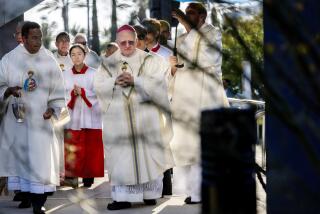Church Asks Dismissal of Nallys’ Suit Over Suicide
- Share via
Attorneys for Grace Community Church of the Valley urged a judge Wednesday to dismiss a “clergy malpractice” case against the church.
The couple who sued, Walter and Maria Nally of Tujunga, have alleged in Glendale Superior Court that pastors at the Sun Valley church contributed to the 1979 suicide of their 24-year-old son, Kenneth, by providing incompetent counseling.
The Nally family’s attorney, Edward Barker, rested his case against the church Wednesday morning after three weeks of testimony.
At that point, church attorneys Samuel Ericsson and David Cooksey asked Judge Joseph R. Kalin to dismiss the lawsuit on the grounds that the family had failed to establish that the church had any legal duty which it could be punished for neglecting.
Kalin is expected to announce his ruling today.
The church’s lawyers also argued that holding ministers accountable for their counseling practices would violate the constitutional separation of church and state.
3 Bases for Suit
The plaintiffs have based their suit on three grounds: clergy malpractice, which has never been tested in court, negligence and outrageous conduct.
They claim that pastors misrepresented to the community that they were adequately trained to deal with problems as severe as depression, suicidal inclinations and schizophrenia.
When they “got in over their heads” with Nally, Barker asserted, the ministers failed to refer him to psychiatrists or psychologists or to tell the family how serious his emotional problems were.
The family also maintains that pastors exacerbated their son’s depression by blaming his emotional problems on sin and then gave him a “green light” to kill himself by instructing him that a person who commits suicide can go to heaven if he has accepted Jesus Christ as his savior.
Ericsson said Barker had failed to establish that pastors had any duty to inform the Nally family that their son had told ministers he wanted to kill himself. The church maintains that ministers have no duty to refer parishioners to licensed mental health professionals, although one defendant, the Rev. John MacArthur, has testified that a week before Nally died he encouraged Nally to see a psychiatrist.
Defense Arguments
If the judge doesn’t dismiss the case, the defense will begin presenting witnesses this morning.
In an argument outside the jury’s presence, Ericsson said the case involves the excessive entanglement of government in religious issues. The Nallys, in effect, are trying to force the state to set standards for spiritual counseling, he said.
“This is the kind of burden on religion that the First Amendment prohibits,” Ericsson said. “This is not a case worthy of driving a wedge between those who need help and those who stand most ready to help. It’s too heavy a price to pay.”
Ericsson asserted that pastors had no legally recognizable relationship as Nally’s psychological counselors but merely talked to him as one friend would to another.
Barker argued that the First Amendment should not be “a blanket that will protect clergymen” from being held accountable for their actions when they tell people that they are competent to counsel the emotionally distressed.
Barker maintained that the First Amendment’s prohibition of church-state entanglement would apply only if ministers had argued that their religious beliefs prevented them from referring troubled parishioners to psychiatrists or psychologists or from informing the family when someone confessed suicidal thoughts to them.
“When you undertake a special relationship, you’ve got some responsibilities,” Barker said.
Plaintiff’s Last Witness
Earlier in the day, the plaintiffs presented their final witness, Dr. Stephen Wilson, a Tarzana psychiatrist, who traced Nally’s depression to 1975 and concluded that the church’s counseling program apparently failed to alleviate his emotional problems.
Equating depression with sin could have worsened Nally’s condition, Wilson said, because the young man placed a great deal of internal pressure on himself to “do the right things.”
Wilson said he based his conclusions on a review of Nally’s personal papers, medical records and the testimony of earlier witnesses.
More to Read
Sign up for Essential California
The most important California stories and recommendations in your inbox every morning.
You may occasionally receive promotional content from the Los Angeles Times.










